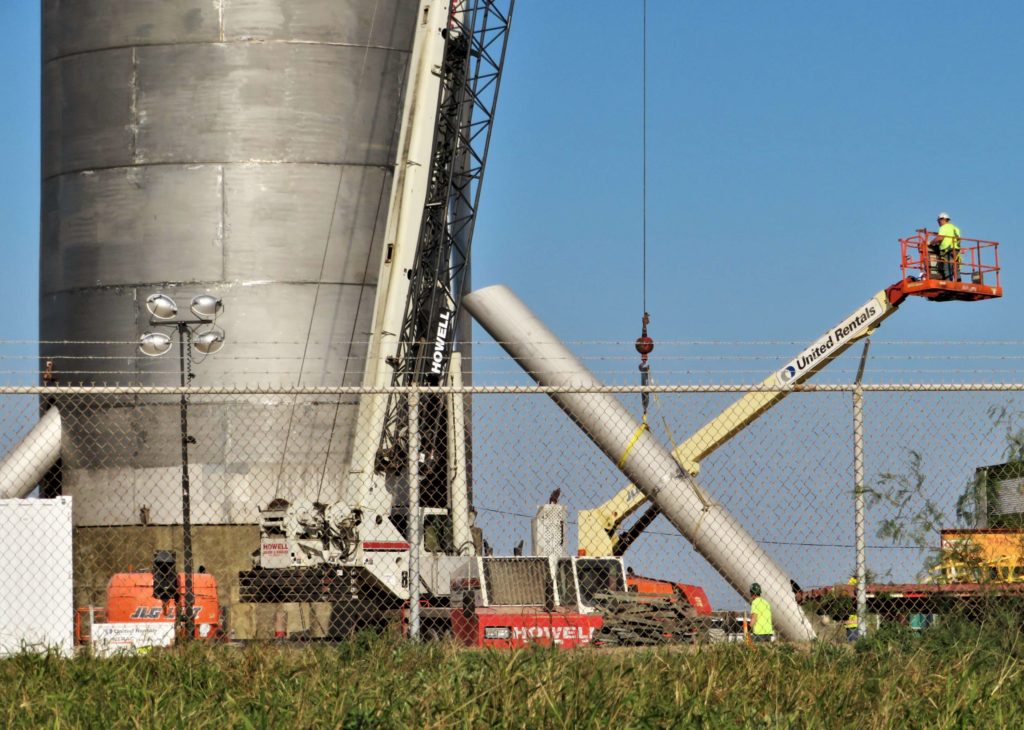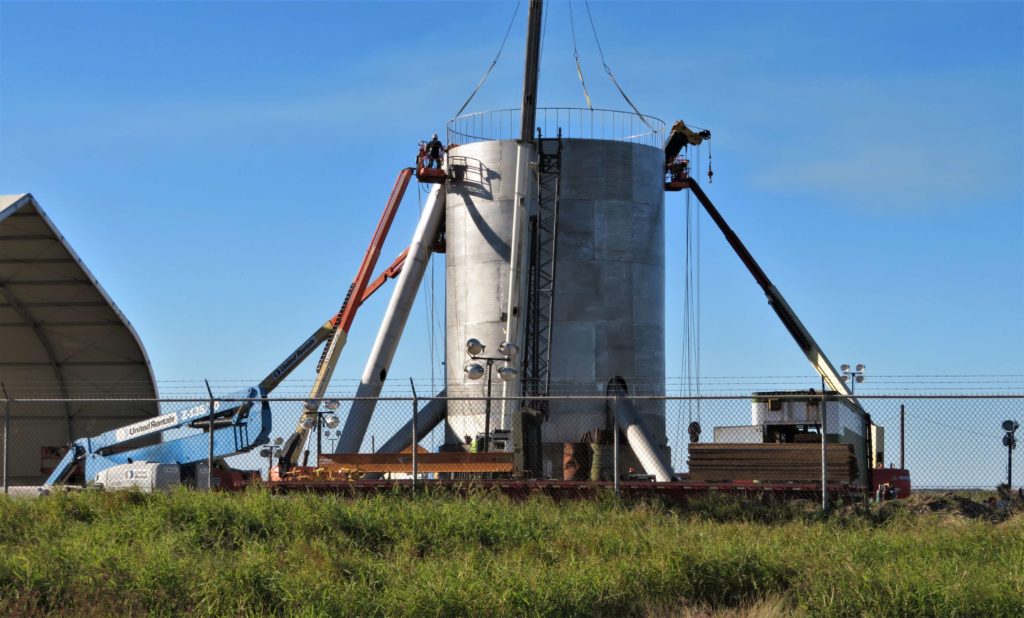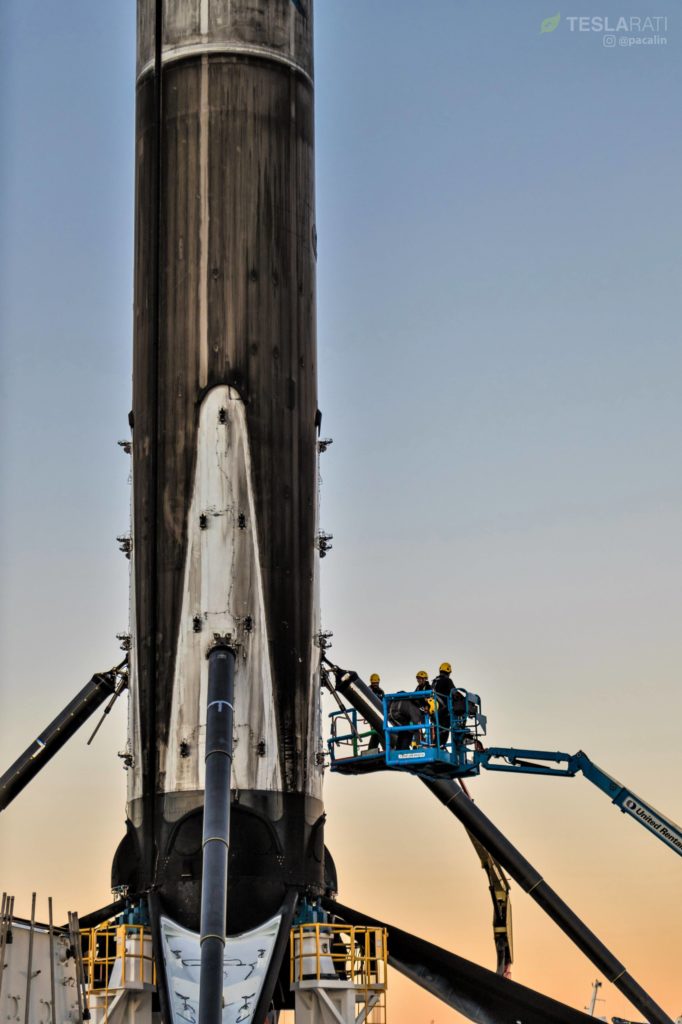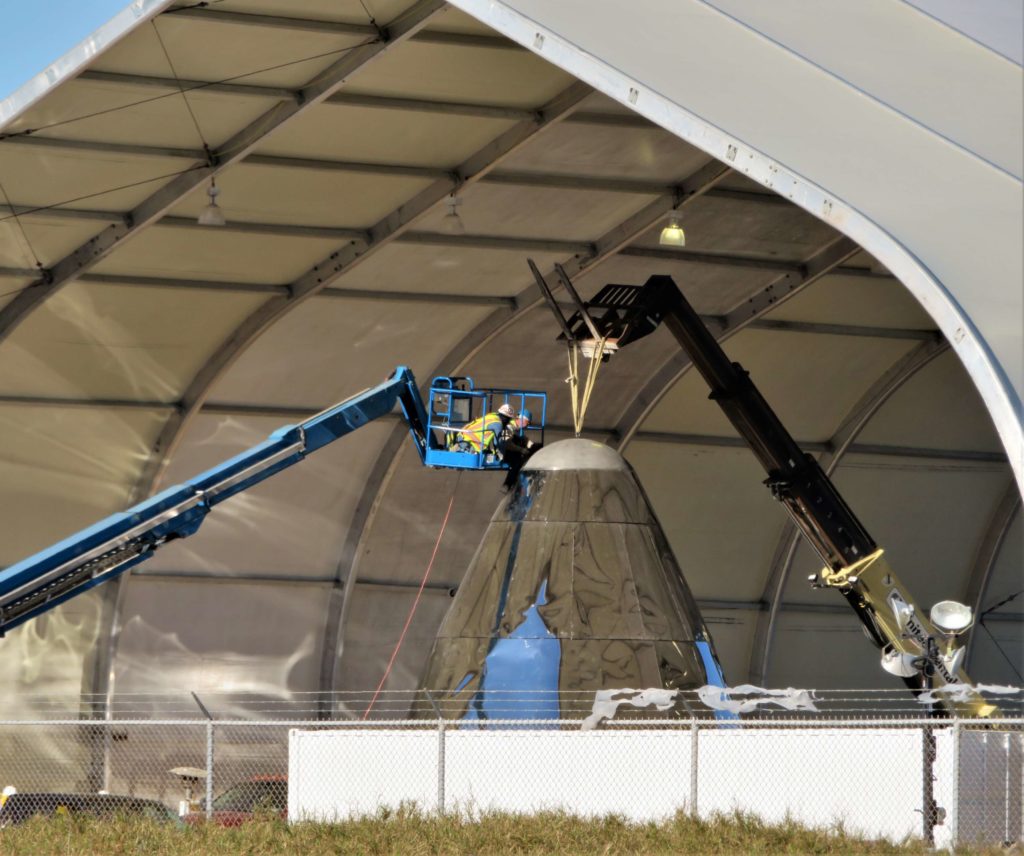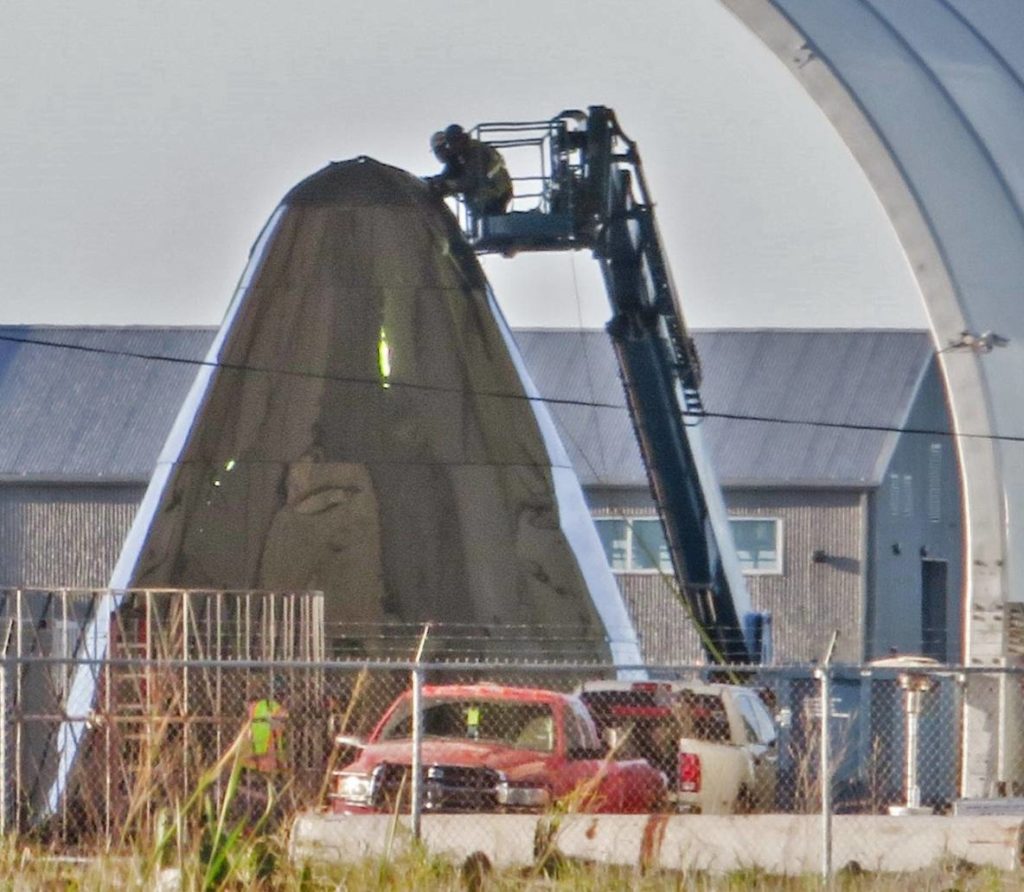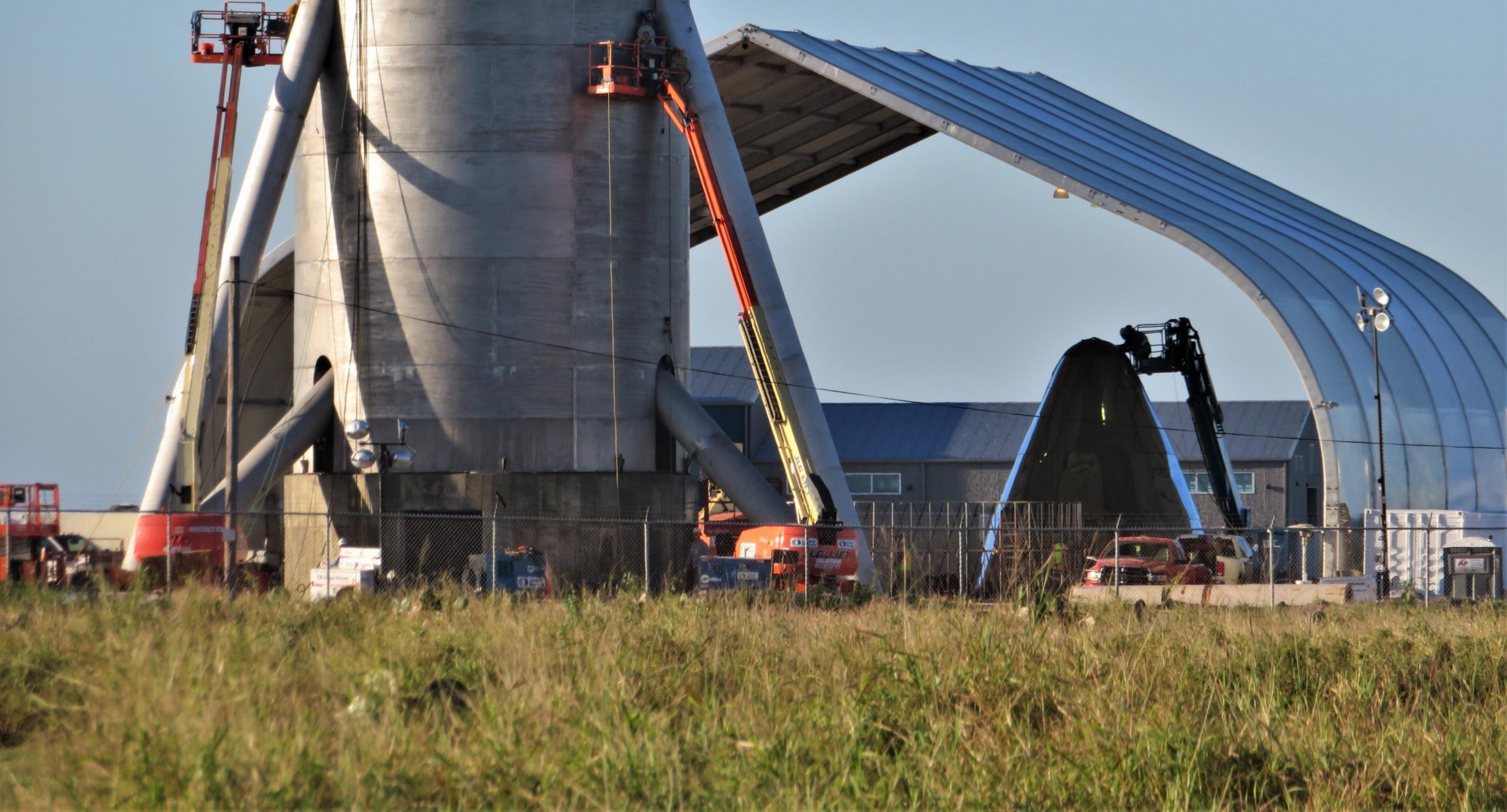
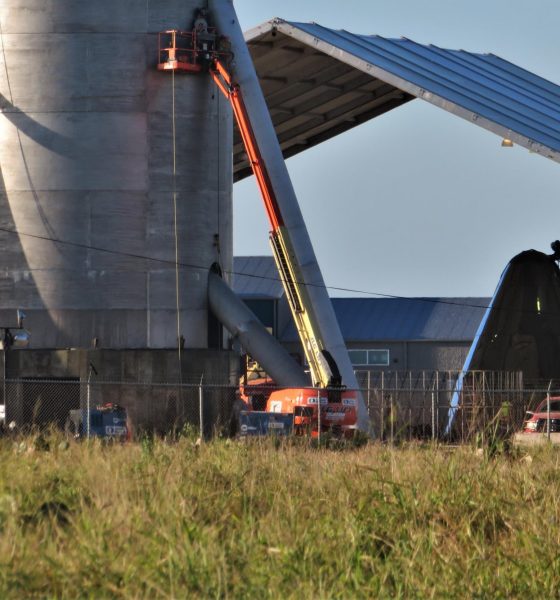
News
SpaceX CEO Elon Musk says Starship (BFS) hop tests could start in early 2019
SpaceX CEO Elon Musk has taken to Twitter to share an unexpected wealth of detail about the “radical” and largely unpublicized design changes the company’s Starship and Super Heavy (BFS & BFB) have undergone in 2018.
Beside information ranging from discussions of metallurgy to overall design philosophy and comparisons, the eccentric CEO also offered the most concrete target yet for the beginning of prototype spaceship (BFS/Starship) hop tests in South Texas – “March/April [2019]”.
I will do a full technical presentation of Starship after the test vehicle we’re building in Texas flies, so hopefully March/April
— Elon Musk (@elonmusk) December 22, 2018
On one hand, this expeditious new testing schedule – acknowledged by Musk himself to be “much sooner than expected” – is a thrilling prospect, given that it implies that a nearly full-scale prototype of Starship (or something vaguely approximating the spacecraft) could take its first baby steps into the air as early as the first quarter of 2019. On the other hand, however, this is an almost bafflingly large schedule change considering that SpaceX President and COO Gwynne Shotwell asserted that a prototype of BFS (now Starship) could begin “hopping” by late 2019, speaking in September 2018.
Shotwell: think we’ll be “hopping” the second stage of BFR (the BFS) late next year. #DARPA60
— Jeff Foust (@jeff_foust) September 6, 2018
Schedules (especially aerospace program schedules) do certainly tend to be chaotic and jumpy, but it’s almost inconceivable that any given project – regardless of the scope or scale – could wind up reaching completion nine months earlier than previously forecasted without suffering one or several dramatic compromises, typically involving lower-fidelity testing and prototypes or watered-down deliverables. It’s unclear if BFR has suffered the same fate, but – to put it lightly – the South Texas sight greeting the eyes of close followers of SpaceX’s BFR program is downright unbelievable.
BFWhat?!
Given the very recent and conspicuous additions of triangular appendages that look precisely like rudimentary fins and an obvious nose cone assembly, the only possible conclusion to draw from photos of SpaceX’s Boca Chica facilities taken in the last week or two is that the company (and/or contractors) are busy building something related to Starship. At least in these early stages, the… thing being built could be best described as what might come to mind if you asked an imaginative kid to build a full-scale sculpture of Tintin’s spaceship on a budget of maybe $500,000.
You got something to show us in Texas? pic.twitter.com/vBF0WwwIfF
— Robotbeat🗽 ➐ (@Robotbeat) December 22, 2018
More likely than not, this could be a case of things being more than they seem. To most, it may almost look like an elaborate prank, but that assumes that we know the full story and have a decent working understanding of aerospace prototyping. For the vast majority of us, that is simply not the case – what looks like a spade is probably not a spade.
At the end of the day, the most basic of observations – that this purported ‘Starship prototype’ will begin hop tests with extraordinarily powerful Raptor engines installed as few as three months from now – suggest that this spooky metal contraption will be used to conduct the most basic of Starship tests. As such, it will probably never travel much faster than Falcon 9’s Grasshopper and F9R predecessors, which tended to gently accelerate from the ground to as high as a kilometer or two before slowly heading back down for a powered landing.
- What now seem to be extremely rough fin outlines were welded to the main steel cylinder like giant metal straws. (bocachicagal – NASASpaceflight)
- ¯\_(ツ)_/¯ (bocachicagal – NASASpaceflight)
- SpaceX recovery technicians work on Falcon 9 with similar cherry-picker lifts, offering a sense of scale of the new Starship water tower. (Pauline Acalin)
- A conspicuous nosecone appears to have arisen inside SpaceX’s new Boca Chica tent, adjacent to what looks like a water tower with tube legs. (bocachicagal – NASASpaceflight)
- (bocachicagal – NASASpaceflight)
Given that SpaceX has already refined this complex and challenging task to a reliable science with Falcon 9 and Merlin 1D, it’s unclear why a very similar test campaign would be of serious value to the company without simultaneously testing full-fidelity control surfaces (fins), exotic new stainless steel propellant tank technologies, and more. Perhaps SpaceX just really wants to ensure that Starship will be capable of landing and taking off from an unprepared and angled surface of the type it could (will?) experience on Mars. Maybe the company simply wants to have a bare-minimum flying platform capable of testing and refining multi-engine configurations of Raptor.
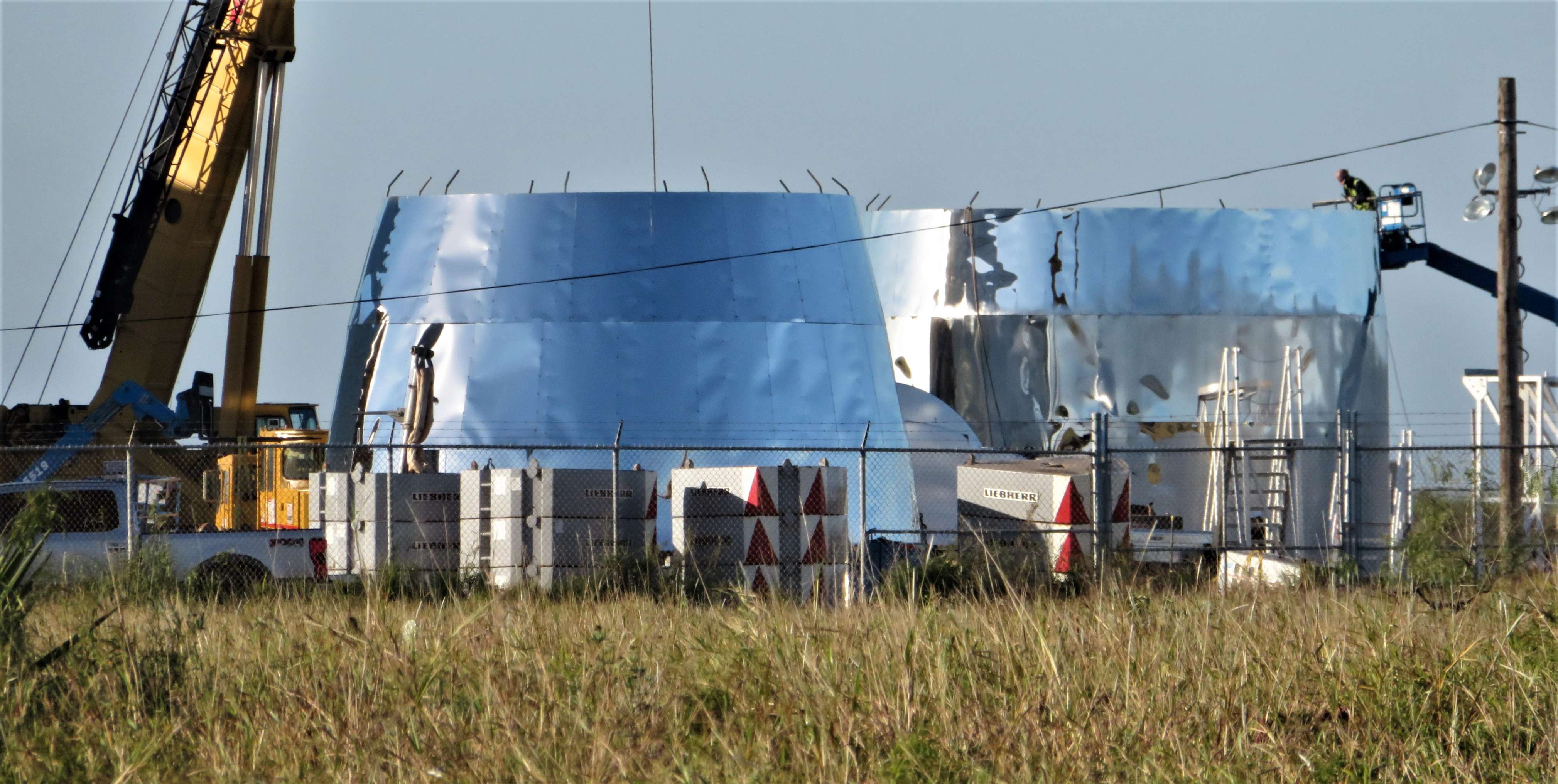
All that can be said for sure at the moment is that the public simply does not have the full story to explain the moderately shocking activity going on in Boca Chica. Musk did state that he would provide another technical update on the status of Starship and the BFR program as a whole in the first half of 2019, but only after the first Starship hopper flights have begun. It would seem that those on the sidelines will simply have to wallow in confusion and wild speculation for another ~3-4 months at minimum, hopefully only going moderately insane as a result.
In the meantime, copious thanks are owed to NASASpaceflight members bocachicagal and Nomadd for their relentless and thorough coverage of SpaceX’s activities in the obscure far south of the Texan coast, as well as their courteous permission for media outlets like Teslarati to republish their photos. Cheers!
For prompt updates, on-the-ground perspectives, and unique glimpses of SpaceX’s rocket recovery fleet check out our brand new LaunchPad and LandingZone newsletters!

News
Tesla ships out update that brings massive change to two big features
“This change only updates the name of certain features and text in your vehicle,” the company wrote in Release Notes for the update, “and does not change the way your features behave.”

Tesla has shipped out an update for its vehicles that was caused specifically by a California lawsuit that threatened the company’s ability to sell cars because of how it named its driver assistance suite.
Tesla shipped out Software Update 2026.2.9 starting last week; we received it already, and it only brings a few minor changes, mostly related to how things are referenced.
“This change only updates the name of certain features and text in your vehicle,” the company wrote in Release Notes for the update, “and does not change the way your features behave.”
The following changes came to Tesla vehicles in the update:
- Navigate on Autopilot has now been renamed to Navigate on Autosteer
- FSD Computer has been renamed to AI Computer
Tesla faced a 30-day sales suspension in California after the state’s Department of Motor Vehicles stated the company had to come into compliance regarding the marketing of its automated driving features.
The agency confirmed on February 18 that it had taken a “corrective action” to resolve the issue. That corrective action was renaming certain parts of its ADAS.
Tesla discontinued its standalone Autopilot offering in January and ramped up the marketing of Full Self-Driving Supervised. Tesla had said on X that the issue with naming “was a ‘consumer protection’ order about the use of the term ‘Autopilot’ in a case where not one single customer came forward to say there’s a problem.”
This was a “consumer protection” order about the use of the term “Autopilot” in a case where not one single customer came forward to say there’s a problem.
Sales in California will continue uninterrupted.
— Tesla North America (@tesla_na) December 17, 2025
It is now compliant with the wishes of the California DMV, and we’re all dealing with it now.
This was the first primary dispute over the terminology of Full Self-Driving, but it has undergone some scrutiny at the federal level, as some government officials have claimed the suite has “deceptive” names. Previous Transportation Secretary Pete Buttigieg was one of those federal-level employees who had an issue with the names “Autopilot” and “Full Self-Driving.”
Tesla sued the California DMV over the ruling last week.
News
Tesla workers push back against Giga Berlin unionization
“IG Metall did not succeed in Giga Berlin‘s works council election earlier today. The union share was reduced from nearly 40% in 2024 to 31% in 2026! This is a clear message by the Giga Berlin team towards an independent co-determination! The list called Giga United, led by the current chairwoman, Michaela Schmitz, received the most votes with more than 40%! Good news for Giga Berlin!”

Tesla workers pushed back against unionization efforts at Gigafactory Berlin, and over the past few years, there has been a dramatic decrease in interest to unionize at the German plant.
Gigafactory Berlin Plant Manager André Thierig announced on Wednesday that IG Metall, the European union group, saw its share reduce from 40 to 31 percent in 2026 as employees eligible to vote on the issue. Instead, the Giga Berlin team, known as Giga United, received the most votes with more than 40 percent.
BREAKING! 🚨
IG Metall did not succeed in Giga Berlin‘s works council election earlier today. The union share was reduced from nearly 40% in 2024 to 31% in 2026!
This is a clear message by theGiga Berlin team towards an independent co-determination!
The list called Giga…
— André Thierig (@AndrThie) March 4, 2026
Thierig gave specific details in a post on X:
“IG Metall did not succeed in Giga Berlin‘s works council election earlier today. The union share was reduced from nearly 40% in 2024 to 31% in 2026! This is a clear message by the Giga Berlin team towards an independent co-determination! The list called Giga United, led by the current chairwoman, Michaela Schmitz, received the most votes with more than 40%! Good news for Giga Berlin!”
There were over 10,700 total employees who were eligible to vote, with 87 percent of them turning out to cast what they wanted. There were three key outcomes: Giga United, IG Metall, and other notable groups, with the most popular being the Polish Initiative.
The 37-seat council remains dominated by non-unionized representatives, preserving Giga Berlin as Germany’s only major auto plant without a collective bargaining agreement.
Thierig and Tesla framed the outcome as employee support for an “independent, flexible, and unbureaucratic” future, enabling acceleration on projects like potential expansions or new models. IG Metall expressed disappointment, accusing management of intimidation tactics and an “unfair” campaign.
The first election of this nature happened back in 2022. In 2024, IG Metall emerged as the largest single faction with 39.4 percent, but non-union lists coalesced for a majority.
But this year was different. There was some extra tension at Giga Berlin this year, as just two weeks ago, an IG Metall rep was accused by Tesla of secretly recording a council meeting. The group countersued for defamation.
Tesla Giga Berlin plant manager faces defamation probe after IG Metall union complaint
This result from the 2026 vote reinforced Tesla’s model of direct employee-management alignment over traditional German union structures, amid ongoing debates about working conditions. IG Metall views it as a setback but continues advocacy. Tesla sees it as validation of its approach in a competitive EV market.
This outcome may influence future labor dynamics at Giga Berlin, including any revival of expansion plans or product lines, which Musk has talked about recently.
News
SpaceX President Gwynne Shotwell details xAI power pledge at White House event
The commitment was announced during an event with United States President Donald Trump.

SpaceX President Gwynne Shotwell stated that xAI will develop 1.2 gigawatts of power at its Memphis-area AI supercomputer site as part of the White House’s new “Ratepayer Protection Pledge.”
The commitment was announced during an event with United States President Donald Trump.
During the White House event, Shotwell stated that xAI’s AI data center near Memphis would include a major energy installation designed to support the facility’s power needs.
“As you know, xAI builds huge supercomputers and data centers and we build them fast. Currently, we’re building one on the Tennessee-Mississippi state line. As part of today’s commitment, we will take extensive additional steps to continue to reduce the costs of electricity for our neighbors…
“xAI will therefore commit to develop 1.2 GW of power as our supercomputer’s primary power source. That will be for every additional data center as well. We will expand what is already the largest global Megapack power installation in the world,” Shotwell said.
She added that the system would provide significant backup power capacity.
“The installation will provide enough backup power to power the city of Memphis, and more than sufficient energy to power the town of Southaven, Mississippi where the data center resides. We will build new substations and invest in electrical infrastructure to provide stability to the area’s grid.”
Shotwell also noted that xAI will be supporting the area’s water supply as well.
“We haven’t talked about it yet, but this is actually quite important. We will build state-of-the-art water recycling plants that will protect approximately 4.7 billion gallons of water from the Memphis aquifer each year. And we will employ thousands of American workers from around the city of Memphis on both sides of the TN-MS border,” she noted.
The Ratepayer Protection Pledge was introduced as part of the federal government’s effort to address concerns about rising electricity costs tied to large AI data centers, as noted in an Insider report. Under the agreement, companies developing major AI infrastructure projects committed to covering their own power generation needs and avoiding additional costs for local ratepayers.
